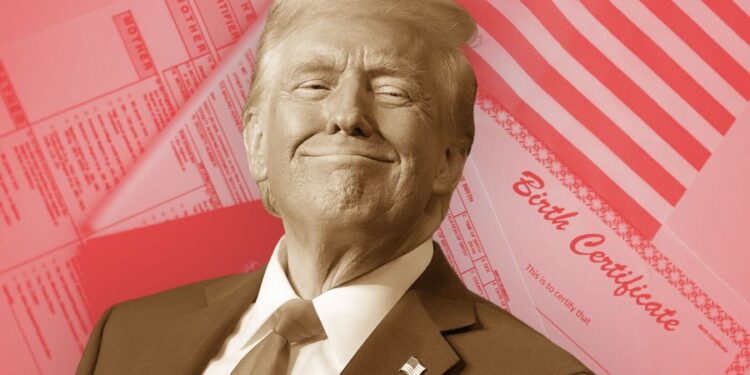
President-elect Trump has doubled down on his vow to end birthright citizenship, a task that would likely face legal challenges as well as skepticism from within his own party.
For starters, the 14th Amendment grants citizenship to those born in the U.S. As a result, most legal experts think Trump wouldn’t be able to end the right through executive order, as he has suggested on the campaign trail and during a recent interview on “Meet the Press.”
Republicans including Florida Gov. Ron DeSantis (R) and Vivek Ramaswamy have also backed the idea of ending birthright citizenship, but for others, the legal roadblocks that would arise raise questions over if it will be popular to reverse a program that automatically grants American citizenship to those born in the U.S. regardless of ancestry.
When questioned if he thinks he can get around the 14th Amendment through executive action, Trump told NBC moderator Kristen Welker, “Well, we’re going to have to get it changed. We’ll maybe have to go back to the people, but we have to end it. We’re the only country that has it, you know.”
“Do you know if somebody sets a foot — just a foot, one foot, you don’t need two — on our land, ‘Congratulations you are now a citizen of the United States of America,’” Trump told NBC. “Yes, we’re going to end that, because it’s ridiculous.”
Trump suggested birthright citizenship was uniquely American — which it is not. Dozens of other countries have birthright citizenship including Canada, Mexico, Brazil, and Peru, among others, according to the CIA.
Some proponents of Trump’s plan say the common interpretation of the 14th Amendment is wrong, zeroing in on a qualification in the citizenship clause restricting birthright citizenship to children born in the U.S. who are “subject to the jurisdiction thereof.”
That exception is traditionally interpreted to exclude only the children of foreign diplomats, foreign enemies in hostile occupation or Native American children subject to tribal laws. But those pushing to redefine it say the exception leaves out children of immigrants in the country illegally, too.
Legal scholars across the ideological spectrum largely agree that the clause is unambiguous.
“You can’t ‘executive order’ your way out of the Constitution,” said Jessica Levinson, a law professor at Loyola Marymount University. “If you want to end birthright citizenship, you need to amend the Constitution, not issue an executive order.”
“The 14th Amendment is clear — period, full stop,” she added. “If you are born in this country, you are a citizen.”
Ilya Somin, the chair of constitutional studies at the Libertarian Cato Institute, argued in a Nov. 25 Just Security article that efforts to deny citizen rights to the U.S.-born children of immigrants would be a “blatant violation of the Fourteenth Amendment, both the text and the original meaning.”
He noted that even Judge James Ho, a Trump appointee to the U.S. Court of Appeals for the Fifth Circuit with a reputation of a judicial rabble-rouser, argued in 2006 and 2015 that birthright citizenship for the children of immigrants in the country illegally is guaranteed by the Fourteenth Amendment.
“That birthright is protected no less for children of undocumented persons than for descendants of Mayflower passengers,” Ho wrote in 2015.
The judge has since walked back that position. He said in an interview with the libertarian Reason Magazine last month that birthright citizenship does not apply in cases of war or invasion, casting immigrants in the country illegally as “invading aliens.”
“No one to my knowledge has ever argued that the children of invading aliens are entitled to birthright citizenship,” he said.
Trump did signal an openness to finding a way for Dreamers, people who were illegally brought to the U.S. at a young age, to stay in the U.S.
“We have to do something about the Dreamers, because these are people that have been brought here at a very young age, and many of these are middle-aged people now, they don’t even speak the language of their country,” Trump told NBC. “I will work with Democrats on a plan.”
The issue of what to do about birthright citizenship and Dreamers has long been debated by the Republican party. During the GOP presidential primary, Ramaswamy said he would deport children of undocumented immigrants with their families — something Trump is also suggesting he do in his second term.
DeSantis said rules as practiced now in the U.S. are “inconsistent with the original understanding of 14th Amendment.” Trump in May, while running for president with curbing immigration a major key to his platform, vowed to end birthright by executive order.
While his vow is hailed by Trump supporters, a former Bush administration official warned that some Republicans will take issue with the idea of drastically changing the law.
“Going after birthright citizenship will be wildly popular among Trump’s base, and it is a legitimate question why the United States is one of the few countries with this basic construct,” the source said. “That said, there will both be legal pushback and angst from the ‘melting-pot’ wing of the Republican party who have long championed the idea that anybody can make it in America.”
Meanwhile, Sen. Mike Lee (R-Utah), a staunch Trump ally, argued on the social platform X Sunday that Congress also has the power to define what it means to be born in America and subject to its jurisdiction.
“While current law contains no such restriction, Congress could pass a law defining what it means to be born in the United States ‘and subject to the jurisdiction thereof,’ excluding prospectively from birthright citizenship individuals born in the U.S. to illegal aliens,” Lee said.
Mike Howell, the executive director for the oversight project at the Heritage Foundation, argued in 2020 that a president can change birthright citizenship through executive order.
“The president doesn’t need Congress to end this practice,” he wrote at the time. “He could issue an executive order instructing federal agencies to issue passports and other government documents and benefits only to those individuals whose status as U.S. citizens meets this requirement.”
But legal experts warn that any effort to undercut the Constitution without outright amending it could face legal challenges, too.
“If you really want to change this, you need to change the Constitution,” Levinson said.







